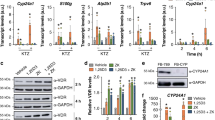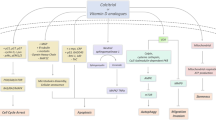Abstract
The GER human pancreatic carcinoma cell line possesses receptors for 1,25-dihydroxyvitamin D3. We report that the vitamin D analogue EB 1089 inhibits the growth of these cells in vitro and when grown as tumour xenografts in immunodeficient mice. Tumour-bearing mice were given EB 1089 at a dose of 5 microg kg(-1) body weight i.p. thrice weekly for 4-6 weeks. Tumour growth was significantly inhibited in treated animals compared with controls in the absence of hypercalcaemia. These findings may have therapeutic implications in pancreatic cancer.
This is a preview of subscription content, access via your institution
Access options
Subscribe to this journal
Receive 24 print issues and online access
$259.00 per year
only $10.79 per issue
Buy this article
- Purchase on Springer Link
- Instant access to full article PDF
Prices may be subject to local taxes which are calculated during checkout
Similar content being viewed by others
Author information
Authors and Affiliations
Rights and permissions
About this article
Cite this article
Colston, K., James, S., Ofori-Kuragu, E. et al. Vitamin D receptors and anti-proliferative effects of vitamin D derivatives in human pancreatic carcinoma cells in vivo and in vitro. Br J Cancer 76, 1017–1020 (1997). https://doi.org/10.1038/bjc.1997.501
Issue Date:
DOI: https://doi.org/10.1038/bjc.1997.501
This article is cited by
-
Epigenetic priming targets tumor heterogeneity to shift transcriptomic phenotype of pancreatic ductal adenocarcinoma towards a Vitamin D susceptible state
Cell Death & Disease (2024)
-
The association between circulating 25-hydroxyvitamin D and pancreatic cancer: a systematic review and meta-analysis of observational studies
European Journal of Nutrition (2024)
-
Therapeutic targets of vitamin D receptor ligands and their pharmacokinetic effects by modulation of transporters and metabolic enzymes
Journal of Pharmaceutical Investigation (2020)
-
Role of vitamin D receptor gene polymorphisms in pancreatic cancer: a case–control study in China
Tumor Biology (2015)
-
Orthotopic mouse models for the preclinical and translational study of targeted therapies against metastatic human thyroid carcinoma with BRAFV600E or wild-type BRAF
Oncogene (2014)



